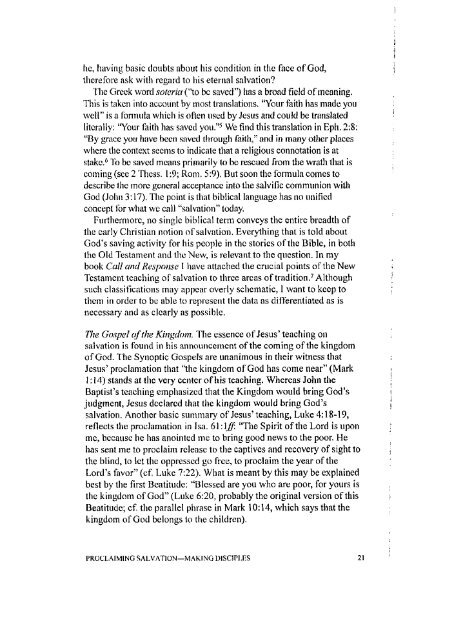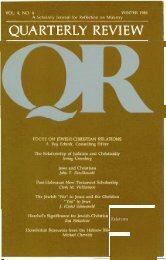Spring 1999 - Quarterly Review
Spring 1999 - Quarterly Review
Spring 1999 - Quarterly Review
You also want an ePaper? Increase the reach of your titles
YUMPU automatically turns print PDFs into web optimized ePapers that Google loves.
he, having basic doubts about his condition in the face of God,therefore ask with regard to his eternal salvation?The Greek word soteria ("to be saved") has a broad field of meaning.This is taken into account by most translations. "Your faith has made youwell" is a formula which is often used by Jesus and could be translatedliterally: 'Your faith has saved you." 5 We find this translation in Eph. 2:8:"By grace you have been saved through faith," and in many other placeswhere the context seems to indicate that a religious connotation is atstake. 6To be saved means primarily to be rescued from the wrath that iscoming (see 2 Thess. 1:9; Rom. 5:9). But soon the formula comes todescribe the more general acceptance into the salvific communion withGod (John 3:17). The point is that biblical language has no unifiedconcept for what we call "salvation" today.Furthermore, no single biblical term conveys the entire breadth ofthe early Christian notion of salvation. Everything that is told aboutGod's saving activity for his people in the stories of the Bible, in boththe Old Testament and the New, is relevant to the question. In mybook Call and Response I have attached the crucial points of the NewTestament teaching of salvation to three areas of tradition. 7Althoughsuch classifications may appear overly schematic, I want to keep tothem in order to be able to represent the data as differentiated as isnecessary and as clearly as possible.The Gospel of the Kingdom. The essence of Jesus' teaching onsalvation is found in his announcement of the coming of the kingdomof God. The Synoptic Gospels are unanimous in their witness thatJesus' proclamation that "the kingdom of God has come near" (Mark1:14) stands at the very center of his teaching. Whereas John theBaptist's teaching emphasized that the Kingdom would bring God'sjudgment, Jesus declared that the kingdom would bring God'ssalvation. Another basic summary of Jesus'teaching, Luke 4:18-19,reflects the proclamation in Isa. G\\\ff. "The Spirit of the Lord is uponme, because he has anointed me to bring good news to the poor. Hehas sent me to proclaim release to the captives and recovery of sight tothe blind, to let the oppressed go free, to proclaim the year of theLord's favor" (cf. Luke 7:22). What is meant by this may be explainedbest by the first Beatitude: "Blessed are you who are poor, for yours isthe kingdom of God" (Luke 6:20, probably the original version of thisBeatitude; cf. the parallel phrase in Mark 10:14, which says that thekingdom of God belongs to the children).PROCLAIMING SALVATION—MAKING DISCIPLES 21












